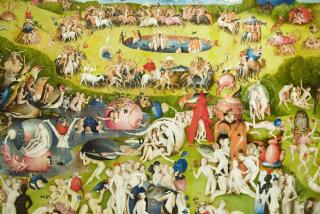Plastic Sorcery : MASCARA <i> by Ariel Dorfman (Viking: $17.95; 158 pp.) </i>
- Share via
“So we’re finally going to meet, Doctor. Face to face, so to speak.”
The opening words of “Mascara” establish the major premises of Ariel Dorfman’s first novel written in English. The work will deliver on its promise of a sinister encounter (with astonishing results); and the immediacy of its tone will distinguish it throughout as a literary event as opposed to a flat narration. What is less readily apparent is that its opening pun hints from the start at a narrative strategy that, despite its indirection, will raise what in less consummate hands might remain merely a fantastic thriller to the level of a political and metaphysical metaphor. As such, “Mascara” places Dorfman in the exalted cultural Parnassus inhabited by Franz Kafka and Kobo Abe.
“Mascara” consists of three sections closely resembling monoplays. The personae are a faceless photographer, a plastic surgeon named Marivelli, and the woman, identified only as Oriana, a victim of multiple personality disorder. The first monologue, which occupies very nearly half the book’s length, consists primarily of an obsessive harangue directed at Dr. Marivelli. In it, the protagonist describes himself as a voyeur, a clandestine photographer and an informer whose bureaucratic position in the Department of Traffic Accidents permits him to infiltrate a spreading network of victims-become-accomplices. All his successes, however, are attributable to his self-admitted “invisibility.” “Nobody remembered me . . . . The world acted as if I had not been born. . . .” His viscerally pornographic, racist and self-pitying digressions are mercifully interrupted by the arrival of a woman named Oriana, who remembers neither her real name nor her past. His diatribe is nearly matched in length by the doctor’s own response.
No run-of-the-mill face cranker, Dr. Marivelli is by his own admission “a plastic surgeon who had sculpted and sewn up the most pre-eminent faces in the country, the public faces with which the powerful governed . . . the elder ones, that they may continue to reign under the newer faces. And the youngest, that they may aspire someday to infiltrate the proudest faces of ancient power.” But Dr. Marivelli has a further ability: “My operations have such an incredible degree of success because along with the old skin, they eliminate old habits, the past.”
Sandwiched between the voices of what must be two of contemporary literature’s more revolting personae, Oriana shows the disturbing signs of multiple personality. Entombed in the mummy case of her walking-talking doll persona, one who is completely forgetful of her past, is the memory of the recording angel who “like(s) the dead, the people who are about to die (who) hear(s), in the miserable cities where people are not the owners of their own hands, thousands of men, thousands of women who await (her).” The hands she describes are the hands of slaves; the mysterious secret police (“Don’t you remember them? A pair of men always in a hurry, blunt, . . . with their knives (and) their photos”) are “the real owners of all the hands in the universe . . . . (And) because I remembered them, they would come to take my very own hands, even before I had passed away . . . . I (would have) to witness and watch . . . what those men would do to my hands, . . . stuffing (them) into boiling water, extracting them pale as sheets, without a wrinkle, without a line that could remind anyone of what they had once caressed.”
With the persona of Oriana, bordering on the archetype where the exterminating and recording angels meet, Dorfman bursts the bonds of political allegory as a genre to include the ultimately inviolable territory that exists between death and life, the regenerative Tibetan Bardo of the universe. In this section, above all others, he reveals the extraordinary power of his imagination.
Is Oriana’s double personality intended to reflect, on the one hand, the innocent notion we hold of American democracy, undisturbed by covert memories, and, on the other, what happens when, as a result of political repression, the notion of liberty survives only as a memory? Does Dorfman mean to imply that the manipulators of power and their supporting infrastructure of secret police are ultimately interchangeable? Or that Dr. Marivelli’s chameleon name changes are there deliberately to suggest that his number is legion? Has Dorfman temporarily switched from the Spanish of his native Chile, with its ongoing legacy of political terror, in order to address us directly in English? And can it be that, in Dr. Marivelli’s words, “Mascara” encodes some disturbing reminders of our own pre-election masquerade?
“Mascara” proves to be a marvelously inventive story of suspense. Not only is the fate of the world at stake, but so is the outcome of a first-class thriller. One suspects, however, that what the author admits in a “sort of” epilogue may have been editorially generated to make the book-as-plot more accessible to the hypothetical “average reader.” It is to Dorfman’s great credit that he manages to bring off this rather obvious tying of loose ends with such magisterial skill. Because, politically speaking, the story has no end. Secret governments and political repression continue to proliferate. No one is immune. In a clear reiteration of his larger meanings Dorfman chooses to break off his epilogue abruptly:
“TO BE CONTINUED . . .”
More to Read
Sign up for our Book Club newsletter
Get the latest news, events and more from the Los Angeles Times Book Club, and help us get L.A. reading and talking.
You may occasionally receive promotional content from the Los Angeles Times.







